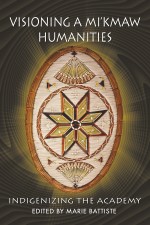Visioning a Mi’kmaw Humanities: Indigenizing the Academy
New edition (2021)
What is understood as the humanities celebrates the educational and humane disciplines of philosophy, history, theology, languages and literatures. Undeniably Eurocentric, the humanities overshadow disciplinary knowledge, ignoring core capacities of all societies and cultures—a kind of cognitive imperialism that is its own authority to define its cognitive traits and preferences as normal and desirable; all other ways of thinking, learning and understanding the world are viewed as deficit. It’s the cognitive equivalent of racism.
In ways that affect everyone, many generations of indigenous peoples have endured the Eurocentric education forced on them, not just in residential schools, but also in provincial public and federal schools and in postsecondary institutions. Eurocentric approaches have cost indigenous peoples plenty: erosion and even loss of many of the indigenous languages; loss of spiritual identities and traditions linked to their ways of knowing; disconnections from Elders, lands, livelihood; and spiritual communicative connections to the land and much more.
<I>Visioning a M’kmaw Humanities</I> urges an agenda of restoration within a multi-disciplinary context for human dignity and the collective dignity of Mi’kmaw peoples. It is about generating a vision of society and education where knowledge systems and languages are reinforced, not diluted, where they can respectfully gather together without resembling each other, and where peoples can participate in the cultural life of a society, education and their community. It aspires to bring new perspectives to our living in relation with each other and with our place, giving new sensibilities to how Mi’kmaq and other indigenous peoples have come to know and appreciate these relationships and the deep holistic learning they have in them.
This new edition includes a new chapter by Fred Metallic, a Mi’kmaw writer and scholar from Listiguj, who has adapted a chapter from his dissertation (York University) in his Mi’gmaw language. This is the first doctoral dissertation in an Indigenous language and marks a new Indigenizing vision and relationship within academia.


